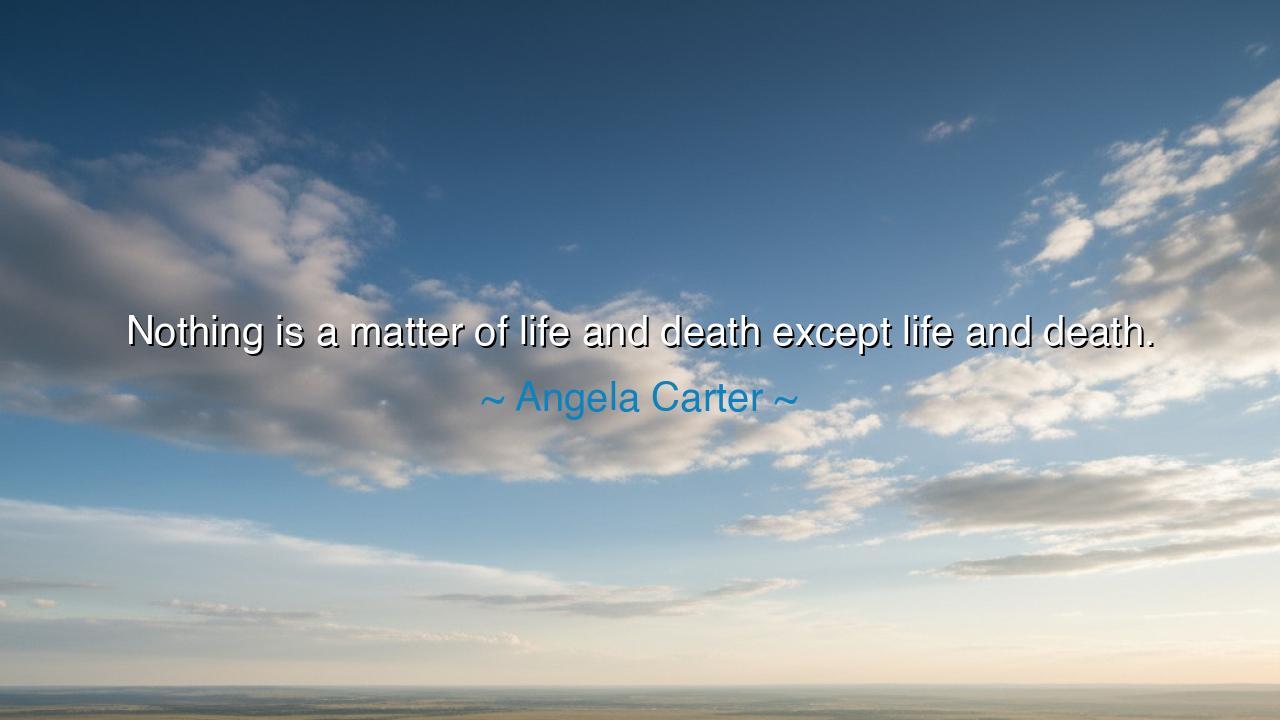
Nothing is a matter of life and death except life and death.






Angela Carter once wrote: “Nothing is a matter of life and death except life and death.” In these few words lies a storm of truth — clear, sharp, and unflinching. Carter, the fierce and visionary storyteller of the twentieth century, was a writer who stripped away illusion to reveal the rawness of existence. Her words remind us that the world trembles with false urgencies — with fears, ambitions, and desires that masquerade as matters of ultimate importance. Yet beneath all these passing concerns, only life and death truly matter. The rest is noise, shadow, the flickering of the candle before the wind.
To understand this saying, we must see the paradox it contains. Life and death are the twin pillars upon which all meaning rests. Everything between them — our work, our triumphs, our quarrels, our fears — exists only in their light and shadow. Carter speaks not to deny the seriousness of living, but to free us from the tyranny of small things. How often do men and women torment themselves over failure, pride, or envy, as though the world itself would crumble for want of their success? But when faced with the grave — when death stands near — all such concerns fall away. In that moment, the heart knows what truly matters: to live fully, to love deeply, to cherish the breath that still moves within the chest.
This wisdom echoes the words of the Stoics, those ancient philosophers who taught that peace of mind is born from the right ordering of values. Marcus Aurelius wrote, “You could leave life right now. Let that determine what you do and say and think.” Carter’s insight stands upon this same foundation — that we suffer not because life is cruel, but because we treat the trivial as sacred, and the sacred as trivial. To remember that only life and death truly matter is to gain freedom — to see beyond the clutter of ego and anxiety, and to live as one who values the fleeting miracle of existence itself.
Consider the example of Ernest Shackleton, the explorer who led his men through the frozen desolation of Antarctica when their ship, Endurance, was crushed by ice. For months they drifted on open seas, starving and freezing, yet Shackleton refused to let despair master them. He knew that their arguments, their ambitions, their petty grievances were nothing — that only life and death mattered now. His entire will turned toward survival, and by his unyielding spirit, every man under his command returned home alive. In that frozen wilderness, stripped of all illusion, Carter’s truth was made flesh: when faced with the ultimate line between life and death, everything else becomes small — and what remains is courage, compassion, and the sacred will to live.
There is, too, in Carter’s words, an invitation to humility. For if nothing but life and death are ultimate, then all our human constructions — wealth, power, reputation — are but passing winds. We are here for a breath of time, and then we vanish. The wise do not clutch at the dust; they cherish the dawn. The fool, meanwhile, spends his days in fury over trifles — until death comes, and the truth is revealed too late. To know that life is the only treasure, and death the only certainty, is to live with grace.
Yet Carter’s vision is not grim. It is liberating. For if we accept that all else is fleeting, we can live with lightness and joy. We can laugh at failure, forgive more quickly, and love without hesitation. The one who understands this quote will not waste years chasing illusions. They will work, yes, but without worshiping their work. They will dream, yes, but without forgetting that dreams, too, must bow before the morning sun. Such a person becomes unshakable — alive to the beauty of every breath, yet calm before the approach of death.
So take this as a teaching for your own life: do not let the temporary tyrannize the eternal. When anger rises, ask yourself, “Will this matter when I face death?” When fear grips you, remember, “I am alive — that is miracle enough.” Rejoice in life, for it is brief; accept death, for it is certain; and let both teach you how to live well. Carter’s words, though written in the language of wit, are the wisdom of ages: only life and death are real — all else is a passing dream.
And when you understand that, you will no longer live as one trembling before the small storms of the world. You will walk as one who knows the secret of existence — that to live with awareness of death is not despair, but awakening. For nothing is a matter of life and death, except life and death themselves. And in that knowledge, there is peace.






AAdministratorAdministrator
Welcome, honored guests. Please leave a comment, we will respond soon